|
|
|
Sort Order |
|
|
|
Items / Page
|
|
|
|
|
|
|
| Srl | Item |
| 1 |
ID:
188702


|
|
|
|
|
| Summary/Abstract |
This article mobilises the notion of global food regime to explore ways in which modern International Relations are reproduced through distinctive patterns of alimentary domination and subversion. It considers three ideal-typical international encounters – the Spanish conquest of the Americas, British rule in South Asia and the US occupation of Japan – to offer a stylised historical-sociological comparison of how food becomes a powerful site of interaction between conflicting dynamics of social differentiation and incorporation, segregation and admixture, and domination and subversion. The Spanish, British and Americans deployed different strategies of alimentary domination in these contexts, which can in large measure be explained with reference to their prevailing mode of production. But they also unleashed equally potent forces of culinary adaptation, transculturation and innovation which, in bringing together a multiplicity of foodways, subverted both the rigid structures of imperial rule and notions of a pristine pre-colonial or national cultural traditions.
|
|
|
|
|
|
|
|
|
|
|
|
|
|
|
|
| 2 |
ID:
188695
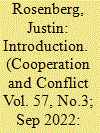

|
|
|
|
|
| Summary/Abstract |
This text introduces the Special Issue on Multiplicity. It sets out the broad research programme of Multiplicity, considers some criticisms that have been made of this programme and then summarises the contributions to the Special Issue.
|
|
|
|
|
|
|
|
|
|
|
|
|
|
|
|
| 3 |
ID:
188696
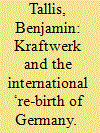

|
|
|
|
|
| Summary/Abstract |
Kraftwerk are widely recognised as one of the most important groups in the history of popular music – and for (West) German national identity in the 20th century. They have been labelled as both typically German and thoroughly cosmopolitan, but, rather than being paradoxical (as some have claimed), this tension reveals an under-explored international politics at work. Using the emerging approach of Multiplicity, I illuminate Kraftwerk’s international dimensions to develop the insight that all societies are inter-societal and all nations international. The article thus intervenes into an ongoing debate in International Political Sociology (IPS) that has seen calls to abandon ‘the international’ in favour of ‘the global’. In practice, this would also ignore ‘the national’ which, as Cultural Studies scholarship on Kraftwerk and recent sociological work shows, remains an important mode of meaning-making. Yet these same literatures dismiss cosmopolitanism or afford no constitutive role to the international, meaning they slide back into methodological nationalism. Using Multiplicity, I address both the national and the cosmopolitan elements of societal identity and suggest a newly co-ontological conception of identity and difference for International Relations (IR). Sketching Kraftwerk’s genesis, innovations, inspirations, influence and importance, I thus illuminate the inter-national politics of the musical ‘re-birth of Germany’.
|
|
|
|
|
|
|
|
|
|
|
|
|
|
|
|
| 4 |
ID:
188699


|
|
|
|
|
| Summary/Abstract |
Human rights in global value chains have become a key field of study in international law and corporate governance. The analysis often starts with a gap – a ‘governance gap’ in human rights protection. This pragmatic starting point calls for pragmatic solutions: better corporate compliance and more accountability. While this goes a long way in addressing corporate misconduct, the global corporate form, its power and legitimation in transnationally generating and appropriating value tend to become naturalized phenomena. Moreover, the effects of accountability agendas on corporate power and legitimation are hardly considered. Instead, I propose to address the ‘human rights problem’ by understanding the corporation and its networks as consequences of international politics – conceptualized as inter-societal multiplicity. The multiplicity lens offers a possibility to replace the governance gap with a productive conception of inter-societal conditions and can complement the focus on accountability and compliance. I conclude the article by tentatively sketching three important consequences of such a starting point for defining the problem of human rights in global value chains: the international dimensions of the division of labour under competitive conditions, the legitimation of corporate practices and the production of knowledge for their regulation.
|
|
|
|
|
|
|
|
|
|
|
|
|
|
|
|
| 5 |
ID:
188701
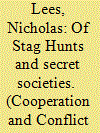

|
|
|
|
|
| Summary/Abstract |
In many circumstances where multiple, autonomous actors exist, cooperation is only a viable strategy if other actors also pursue a strategy of cooperation. Such situations can be characterised in terms of the Stag Hunt, based on a parable told by Rousseau. Although traditionally interpreted as a device for understanding how mutually beneficial cooperation can emerge, Harrison Wagner points out that would-be exploiters must overcome similar problems to succeed at subjugating others. Successful cooperation may have the ironic consequence of enabling deeper conflict within and between a multiplicity of societies. Despite its canonical status, the importance of the Stag Hunt for understanding the interaction between multiple societies may have been underestimated.
Nonetheless, rational choice theory alone cannot explain how cooperation-for-predation became established, while historical sociology’s conventional ‘materialist metanarrative’ of the origin of war and the state may have unduly neglected the role of gender relations. The phenomenon of men’s secret societies, found in many stateless societies, indicates that fraternal solidarity within coalitions of men competing to control women’s labour and bodies may provide a path to the nucleation of warlike states. If this is correct, it becomes clear that in many societies, men and women experience multiplicity in qualitatively different ways.
|
|
|
|
|
|
|
|
|
|
|
|
|
|
|
|
| 6 |
ID:
188698
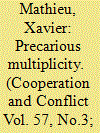

|
|
|
|
|
| Summary/Abstract |
This article investigates the portrayal by French policy-makers of the so-called Islamic State ‘foreign fighters’. I provide an in-depth analysis of the discursive construction of these ‘foreign fighters’ as different and detached from the (French) Self. I do so through a questioning of the notion of multiplicity, revealing how it exists precariously and the consequences this precariousness has on the notion itself. First, multiplicity emerges in ‘strange’ places as identities are being remodelled through new combinations. Second, the coexistence implied by multiplicity needs to be complexified to account for the way it helps preserve but also sometimes erase difference (and thus multiplicity itself). Finally, because of the precariousness of multiplicity, unexpected outcomes can be produced by the encounter with difference (such as the policy of non-repatriation of the ‘foreign fighters’). Overall, multiplicity can be usefully questioned by looking at these instances of instability and doubt. As such, this article shares the concerns expressed by critical scholars that multiplicity recreates problematic distinctions between inside and outside. As a response, my analysis contributes to an understanding of multiplicity as always in the making, revealing how various discursive strategies are used to temporarily and imperfectly stabilise boundaries.
|
|
|
|
|
|
|
|
|
|
|
|
|
|
|
|
| 7 |
ID:
188700
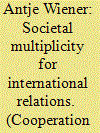

|
|
|
|
|
| Summary/Abstract |
This article discusses the societal multiplicity proposition as a welcome conceptual proposition for IR. First, it argues that against the background of the discipline’s trajectory and especially Adler’s call for a turn towards ‘the social’ in the 1990s, Rosenberg’s proposition offers a nudge towards scrutinising concepts for a more concise and systematic appreciation of societal multiplicity as a source of knowledge production in a globalised world. Second, this is illustrated with reference to the challenge of building global governance from below as the international liberal order stands contested and alliances are re-negotiated. Third, it demonstrates why during this period of global change it is key to diversify sources of meaning-making and the conceptual categories to reflect this diversification. And fourth, it turns to practices of contestation as drivers of inter-societal negotiations that target both established fundamental norms of global governance (e.g. the rule of law, human rights, and democracy) and more recently, negotiated fundamental norms (e.g. climate justice, gender justice, or intergenerational justice). The article concludes that a conceptual shift from the agency of states and their representatives as carriers of knowledge and mediators of normative change towards engaging societal agency represents a welcome contribution.
|
|
|
|
|
|
|
|
|
|
|
|
|
|
|
|
| 8 |
ID:
188697
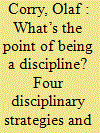

|
|
|
|
|
| Summary/Abstract |
While disciplinary identities are among the most fraught subjects in academia, much less attention has been given to what disciplinarity actually entails and what risks different disciplinary strategies involve. This article sets out a theory of disciplinarity that recognises not only their coercive but also their redeeming features, particularly in view of the coexistence of multiple competing disciplines and powerful transdisciplinary movements (such as rationalism). On this basis it identifies four disciplinary strategies and each is assessed in relation to the future of IR: (1) remaining a subdiscipline of Political Science (‘stay put’), (2) becoming an interdisciplinary field (‘reach out’), (3) dissolving into transdisciplinarity or abolishing IR (‘burn down’), or (4) establishing IR as a discipline in its own right (‘break out’). Rejecting the false choice of disciplinary constraint versus epistemic freedom, this framework allows IR and other subfields to more consciously consider a range of disciplinary strategies and to entertain the risks and affordances they each offer. The article concludes that a future independent discipline focused on the implications of ‘the international’ not just for politics but all fields – including disciplinarity – would make for a broader, more diverse IR, ultimately also better able to engage other disciplines.
|
|
|
|
|
|
|
|
|
|
|
|
|
|
|
|
|
|
|
|
|